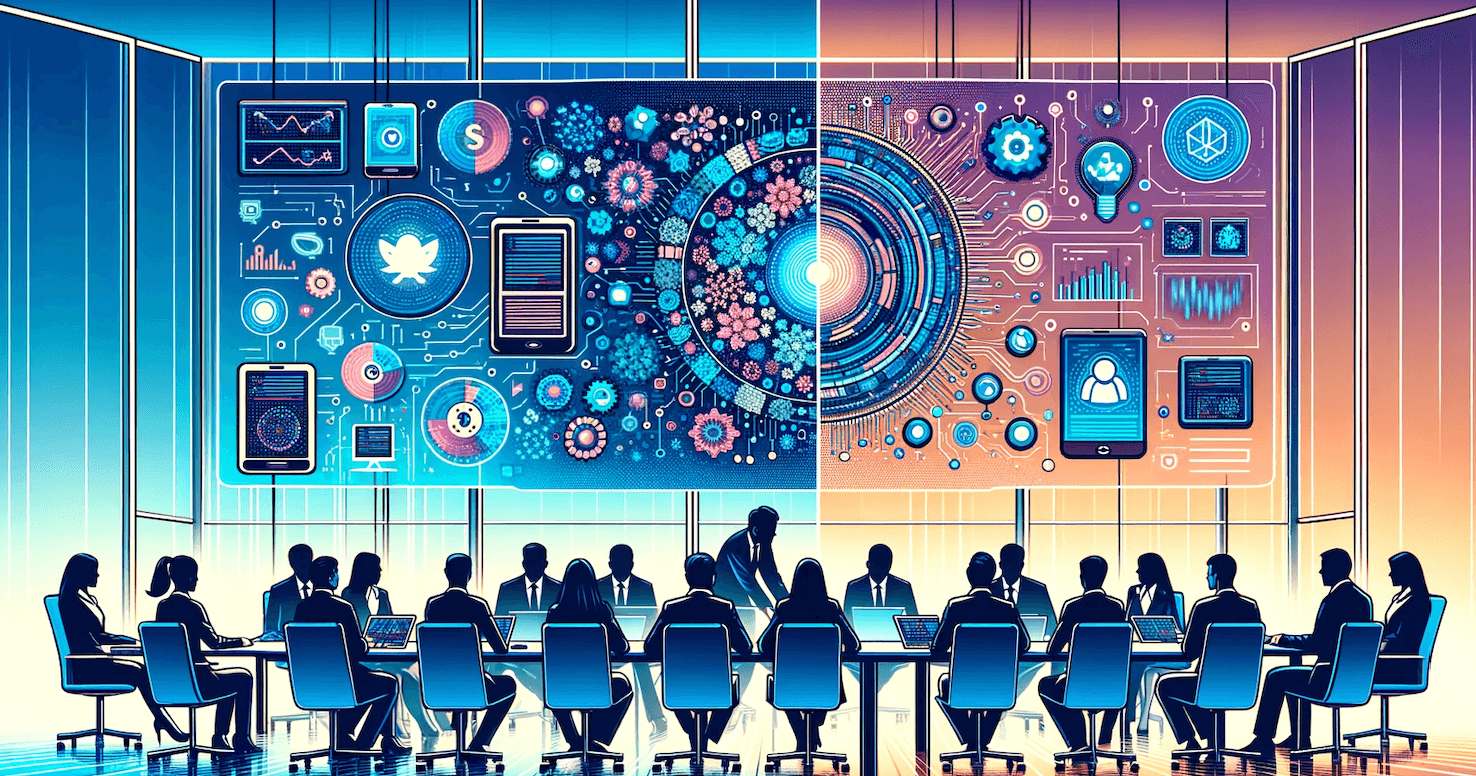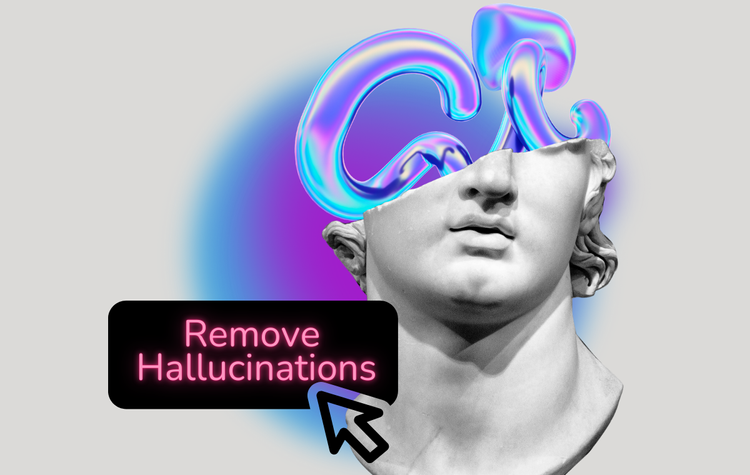How to Select the Best Enterprise Chatbot Platform
With enterprise chatbot platforms like Gleen AI, businesses can safely upload their proprietary knowledge, understand an infinite number of customer and employee questions, and provide fast, relevant answers without hallucinating.

Introduction
Enterprise chatbots have the potential to improve customer service and employee knowledge sharing. They can also help both types of users self-serve.
This guide provides tips on how to evaluate a chatbot platform for enterprise customer service.
What is a Chatbot?
A chatbot is a computer software program that interacts with users, like a real person might.
Two types of enterprise chatbots exist:
- Customer-Focused Chatbots: These chatbots enhance customer satisfaction and streamline service processes.
- Employee-Facing Chatbots: These chatbots provide tailored and practical support to employees, addressing specific organizational needs.
Chatbots use very different technologies.
The simplest and oldest chatbots use rules or decision trees. These chatbots require enterprises to map out pre-determined user flows. Customers interact with a series of menus and sub-menus. Rule-based chatbots are extremely inflexible and often don't meet the needs of end users.
Another old chatbot technology is keyword matching. Keyword matching chatbots simply look for the presence of a keyword in the end user's question. If the chatbot detects the presence of a keyword, the chatbot shows a pre-determined response.
Keyword matching chatbots often misunderstand complex user questions.
Slightly better than keyword matching is question matching. These chatbots are also called conversational AI chatbots, because they use natural language processing (NLP) and natural language understanding (NLU) -- AI techniques -- to understand the user's question.
Question matching chatbots are slightly better at understanding user questions than keyword matching chatbots. However, they still require enterprises to create a list of pre-determined list questions and answers. (Some chatbots may require multiple versions of the same question.).
The most recent technology is generative AI. Generative AI chatbots (like ChatGPT and Gleen AI) use Large Language Models (LLMs), which are advanced AI models. LLMs enable generative AI chatbots to both better understand user questions and create highly relevant answers to questions.
Get a demo of Gleen AI, or create your own generative AI chatbot for free using Gleen AI now.
What are Alternatives to an Enterprise Chatbot Platform?
When enterprises need a chatbot, they have a build versus buy decision.
An enterprise chatbot platform is a commercial software solution that enterprises can license or rent.
Instead of licensing an enterprise software platform, enterprises can build their own generative AI chatbot. Enterprises can do one or more of the following:
- They can build their own custom Large Language Model (LLM). This requires millions of dollars to buy graphical processing units and hire/rent machine learning experts.
- They can fine-tune pre-trained LLMs. Fine-tuning an LLM on their own knowledge and data can improve the results of the LLM. Fine-tuning, however, still requires time, money, and machine learning expertise.
- They can build their own chatbot applications using the APIs of pre-trained LLMs, like GPT-3.5 or GPT-4. Building their own chatbot applications requires a software development team to build and maintain the application.
- They could try to use GPTs, which are customized versions of ChatGPT that Open AI announced in November of 2023. GPTs, however, have severe limits on the size of knowledge uploads. They have a tendency to leak proprietary knowledge.
In addition, you can't supervise GPT performance. You can't monitor the questions asked of a GPT, and you can't monitor or supervise GPT responses.
Most importantly: none of the above approaches solves the biggest problem with generative AI: hallucination.
Hallucination is the tendency for LLMs (and any generative AI solution that uses LLMs) to create inaccurate responses.
LLMs are machine learning models that simply predict the next most probable word in a conversation. The LLM has no idea if the sentence or paragraph in generates has any factual basis.
Hallucination is a built-in feature of LLMs, not a defect. What this means is:
- Custom LLMs will hallucinate,
- Fine-tuned LLMs will hallucinate,
- Chatbot applications that simply call APIs of pre-trained LLMs will hallucinate, and
- GPTs (which are customized versions of ChatGPT) will hallucinate.
For example, we trained Gleen AI and a GPT on the same knowledge. In the video below, you can see that the GPT makes up random facts, while Gleen AI doesn't.
Every company creating its own AI chatbot and wanting accurate responses must address the hallucination issue.
Solving the hallucination issue is a tall order.
You can throw time, energy, and resources at building your own chatbot solutions and solving the hallucination problem.
Alternatively, you can rent/license an enterprise chatbot platform.
Key Advantages of Enterprise Chatbot Platforms
The best enterprise customer service chatbot platforms greatly improve how businesses communicate with users and handle internal tasks.
Here's an overview of the key benefits of enterprise chatbot platforms, relative to building your own chatbot:
- Faster time to market. Enterprise chatbot platforms should save enterprises valuable time in getting one or more chatbots to market. Leveraging a chatbot platform is an alternative to building a custom chatbot (or multiple chatbots) internally.
- Off-the-shelf integrations: An enterprise chatbot platform should have pre-made integrations with many leading solutions
- Generative AI expertise: Enterprise chatbot platforms should already have generative AI expertise in house. You shouldn't have to become a machine learning expert or a prompt engineer to use an enterprise chatbot platform.
- Greater versatility: Enterprise chatbot platforms should solve a wider number of use cases. Even if you don't currently need all those use cases, you can and probably will grow into them.
- Scalability: Enterprise chatbot platforms have already solved horizontal scalability across their customers. You won't have to worry about making your chatbot horizontally scalable.
- More production experience: Deploying a generative AI chatbot can be tricky, and sometimes even embarassing. An enterprise chatbot platform vendor should have multiple production deployments already under their belt. They'll be more familiar with the corner cases and failure modes around a generative AI chatbot.
- Focus: When you license an enterprise chatbot platform, you partner with a focused team. That team is dedicated to building and improving a generative AI chatbot. If you build a chatbot internally, the chatbot might be one of many projects. Other project could easily derail your chatbot or improvements to it.
Selecting the Right Enterprise Chatbot Platform
When assessing an enterprise chatbot platform, consider the following criteria:
1. Generative AI Use: Determines the platform's underlying technology. Does it use generative AI? Generative AI helps the chatbot understand complex questions and generative highly relevant answers.
2. Custom Knowledge Ingestion: The enterprise chatbot platform should utilize a company-specific knowledge base for accurate responses. There should be no limit to the amount of company-specific data.
3. Accuracy in Responses: The platform should use company-specific information to generate responses. The platform should also avoid hallucinations.
4. Security and Privacy The platform should adhere to SOC 2 Type 2 standards.
5. Monitoring Capabilities: The platform should give you the ability to oversee all chatbot questions and responses.
6. Feedback & Improvement: The platform should collect user and admin feedback on its responses. The platform should also continuously improve response quality based on feedback.
7. Agent Assist & Agent Transfer: Agents should be able to use the platform in Agent Assist mode to improve efficiency of customer support. The chatbot should also seamlessly transfer customers to live chat or email after business hours.
8. Ease of Maintenance: The platform should automatically update the chatbot's knowledge base.
9. Integration Simplicity: The platform should integrate with existing company systems, including your knowledge base, help desk, and CRM. It should also integrate with all your customer support channels, including email, live chat, Slack, and Discord.
10. The ability to take action. The platform should to assist users in completing tasks, not just answer questions.
11. Multiple Chatbots: You should be able to operate multiple chatbots on the platform. You can copy and change chatbots to make different chatbots for various purposes.
12. LLM Agnostic: The chatbot platform should be compatible with any Large Language Model. This includes both third party-hosted LLMs and self-hosted LLMs.
13. Public Cloud Agnostic: The chatbot platform should allow you to choose where it is hosted: AWS, Azure, or Google Cloud.
14. Single Tenancy: You should have the option of running the platform on a dedicated app and database instance.
15. Dedicated Hosting: You should have the option of running the platform on a dedicated host.
16. Private Network Connection: You can choose to have a secure connection between your VPC and the chatbot platform.
17. Scalability: The chatbot platform should be horizontally scalable.
18. Service Availability Guarantees: The chatbot platform vendor should have defined levels of uptime provided.
19. Customer Service Commitments: The chatbot platform vendor should commit to customer service response times.
20. Graceful failure mode. The chatbot should have acceptable behavior, both during scheduled and unscheduled downtime.
Conclusion
The best enterprise chatbot platforms lead business innovation, particularly those employing generative AI technologies. They make talking to customers and helping employees easier and more efficient.
With enterprise chatbot platforms like Gleen AI, businesses can safely upload their proprietary knowledge, understand an infinite number of customer and employee questions, and provide fast, relevant answers without hallucinating.
Gleen AI Enterprise Edition also has the following enterprise-ready options:
- Self-hosted LLM
- Single tenancy
- Dedicated hosting
- Public cloud of choice: AWS, Azure, or Google Cloud
- Virtual Private Connection to your VPC
- Enhanced Support SLAs
Get a demo of Gleen AI, or create your own generative AI chatbot for free using Gleen AI now.



